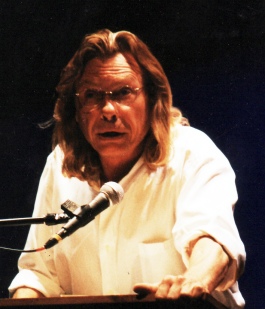Thomas Lux blogs about his P&W-funded reading with Jon Sands for Page Meets Stage, a reading series in New York City. Lux is Bourne Professor of Poetry at the Georgia Institute of Technology. He has two new books out this fall—the poetry collection Child Made of Sand (Houghton Mifflin Harcourt) and his nonfiction debut From the Southland (Marick Press).
 I’d heard Jon Sands read and perform a few years earlier at Sarah Lawrence College. The budget for readings was always meager and P&W has helped out several times. I believe P&W kicked in for a tribute to Muriel Rukeyser, not long before she died.
I’d heard Jon Sands read and perform a few years earlier at Sarah Lawrence College. The budget for readings was always meager and P&W has helped out several times. I believe P&W kicked in for a tribute to Muriel Rukeyser, not long before she died.
Page Meets Stage was started by Taylor Mali and others, several years ago, and was originally called Page Versus Stage. It’s now called Page Meets Stage. “Versus” sounded like an unfair fight to me—page poets are mostly older and would get our asses kicked by the stage poets, who are generally younger, and kick ass anyway, just for fun. So they changed the name. I contend, however, that the people there weren’t concerned with what it was called—they were there for poetry.
I’d read in the program several years before with Marty McConnell, a stunning spoken word/poet, at the storied Bowery Poetry Club, started by Bob Holman, an éminence grise of the spoken word/poet poetry world.
On September 19th, Page Meets Stage held its reading, for the first time ever, at that miracle place, Poets House. It’s in the Battery (as I write this, Storm Sandy is expected to hit the Battery hard) and not too far from Ground Zero. It’s brand new and has two floors filled with poetry books, over 50,000 of them! They also offer many outreach programs and are completely inclusive. They even have sleepovers. Borges said something like: “I can only sleep in a room filled with books.” At Poets House he’d sleep like a big fat baby! It exists, in a nutshell, to serve the art form of poetry. Recently, a student considering taking a class of mine wrote asking for a copy of my syllabus. I wrote back: “Go to NYC, go to Poets House, find the exact center of it, stand there, and turn around 360 degrees. That’s my syllabus.” He responded not.
I often ask Taylor (a premier spoken word/poet): What the bleep’s the difference? Only one, and it’s not even a rule: spoken word/poets tend to memorize their poems. All poets have to write first, on a page, or on a screen, and—this shouldn’t come as a surprise—it’s hard to write well. Page poets give readings; spoken word/poets give readings but tend to call them “performances.” Some stage poets are breathtakingly self-indulgent, some page poets lay on the pseudo-profundity so much I can only hope someday someone translates them into readable English! Taylor usually gives an erudite and nuanced answer to my question.
I still don’t see much difference. It was a larger, younger, more boisterous crowd than the night before at the gallery. Sands is an excellent young spoken word/poet, and his delivery is intense. He leans slightly forward, almost as if he’s walking into a strong wind, and speaks his poems. No histrionics, little body movement—he held the audience with every syllable. We read alternately, trying to bounce poems off each other. It was a blast. Let me put it this way: do not badmouth, or say anything supercilious, around me re: performance poetry. It’s likely I’d fall asleep right in your face.
Photo: Thomas Lux.
Support for Readings/Workshops in New York City is provided, in part, by public funds from the New York State Council on the Arts and the New York City Department of Cultural Affairs, with additional support from the Louis & Anne Abrons Foundation, the Axe-Houghton Foundation, The Cowles Charitable Trust, the Abbey K. Starr Charitable Trust, and the Friends of Poets & Writers.






